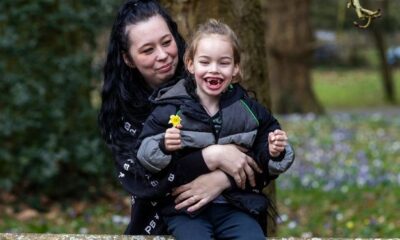Health
Couples Navigate Intimacy Challenges Amid Mental Health Struggles

Relationships often face challenges, especially when mental health issues come into play. Two men, Luis and Henry, share their experiences regarding intimacy and the impact of depression on their sexual relationship. They have been together for over a decade, having met on Grindr shortly after Luis moved to the UK. Their journey highlights the complexities of love, desire, and the struggle for connection.
Luis and Henry have not been intimate for six months, with their last sexual encounter occurring a year prior. The frequency of their intimacy has drastically declined, a shift that Luis attributes to his ongoing battle with depression. Initially, it was Luis who took the lead in their sexual relationship, but he now finds himself hesitant to initiate. A previous rejection left him feeling disheartened, although he tries not to take it personally.
Since being diagnosed with depression five years ago, Luis’s libido has significantly diminished. He currently takes medication that complicates his sexual desire, which has led him to feel disconnected from Henry. They have the option to explore sexual relationships outside of their partnership, but Luis expresses that he does not wish to experience intimacy with anyone else. Instead, he finds solace in self-exploration, using the Grindr app to connect with his fantasies.
The emotional bond between Luis and Henry remains strong. Luis admires Henry for his loving nature and dedication to teaching, traits that can sometimes overshadow their relationship. Luis recognizes that while he is there for others, he often neglects his own well-being. Despite his struggles with body confidence and attractiveness, he maintains a deep attraction to Henry. He hopes that as Luis gradually reduces his medication, his libido may return, and their intimacy can be rekindled.
Intimacy Redefined
Luis acknowledges that the two have reached a crossroads. While he considers Luis his best friend and values their emotional connection, he feels the need for more physical intimacy. He stresses that their sexual encounters do not always need to result in penetration or climax. Instead, he wishes to focus on touching and pleasure, easing the pressure on both partners.
Henry, on the other hand, has his own set of challenges. He grapples with feelings of inadequacy stemming from a childhood where he felt he had to excel to be accepted. His struggles with depression and the loss of his father have created a barrier to intimacy with Luis. He often worries that he will disappoint his partner if he is unable to perform sexually, leading him to prefer rejection over the possibility of failure.
For Henry, encounters with others on Grindr have felt transactional, lacking the emotional depth he shares with Luis. He describes a recent moment of intimacy when he initiated sexual contact, feeling less burdened by intrusive thoughts. His understanding nature has helped him adapt to the situation, as he tries to create a stress-free environment for both himself and Luis during their intimate moments.
Both partners aspire to foster a more profound connection. They seek a space where they can experience pleasure without the pressure of performance. Luis hopes that as they navigate their challenges together, they can find a balance that allows them to reconnect both emotionally and physically.
The journey of Luis and Henry serves as a reminder of the importance of communication and understanding in relationships, especially when mental health issues are present. Their story reflects the reality that intimacy can be redefined, focusing on emotional connection as much as physical interaction. As they continue to support each other, they remain hopeful for a future where intimacy becomes a joyful and fulfilling part of their lives once again.
-

 Entertainment3 months ago
Entertainment3 months agoAnn Ming Reflects on ITV’s ‘I Fought the Law’ Drama
-

 Entertainment4 months ago
Entertainment4 months agoKate Garraway Sells £2 Million Home Amid Financial Struggles
-

 Health3 months ago
Health3 months agoKatie Price Faces New Health Concerns After Cancer Symptoms Resurface
-

 Entertainment3 months ago
Entertainment3 months agoCoronation Street’s Carl Webster Faces Trouble with New Affairs
-

 Entertainment3 months ago
Entertainment3 months agoWhere is Tinder Swindler Simon Leviev? Latest Updates Revealed
-

 Entertainment4 months ago
Entertainment4 months agoMarkiplier Addresses AI Controversy During Livestream Response
-

 World2 weeks ago
World2 weeks agoBailey Announces Heartbreaking Split from Rebecca After Reunion
-

 Science1 month ago
Science1 month agoBrian Cox Addresses Claims of Alien Probe in 3I/ATLAS Discovery
-

 Entertainment2 weeks ago
Entertainment2 weeks agoCoronation Street Fans React as Todd Faces Heartbreaking Choice
-

 Health4 months ago
Health4 months agoCarol Vorderman Reflects on Health Scare and Family Support
-

 Entertainment4 months ago
Entertainment4 months agoKim Cattrall Posts Cryptic Message After HBO’s Sequel Cancellation
-

 Entertainment3 months ago
Entertainment3 months agoOlivia Attwood Opens Up About Fallout with Former Best Friend





















